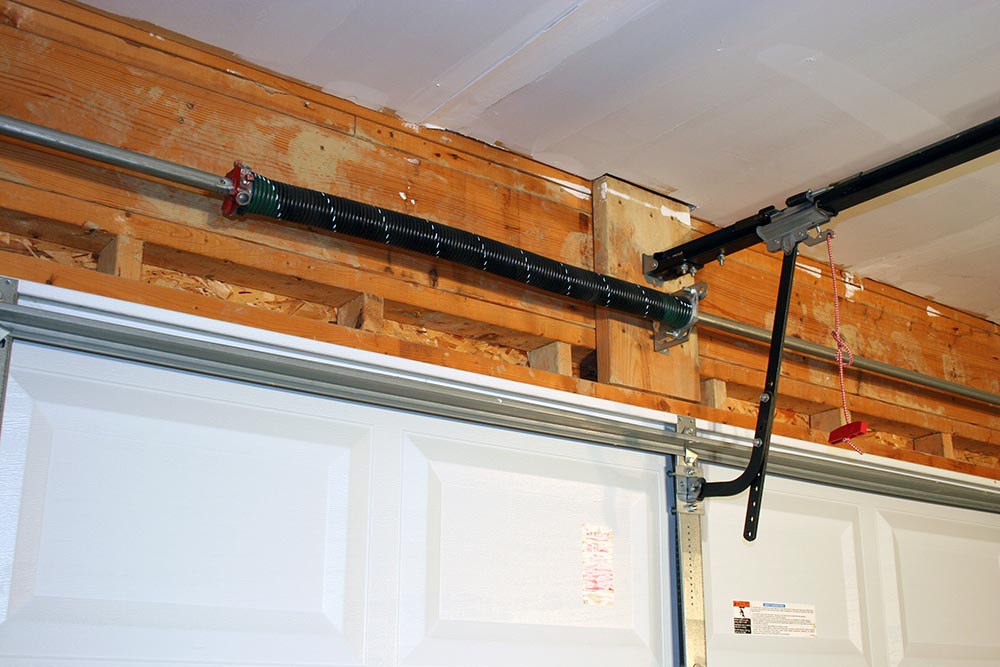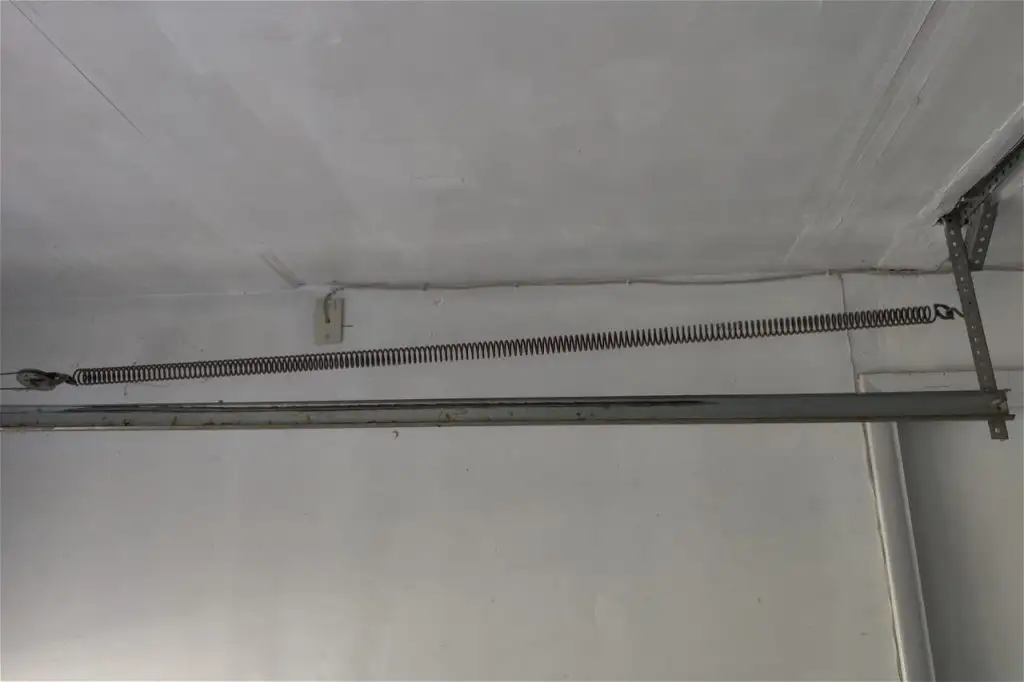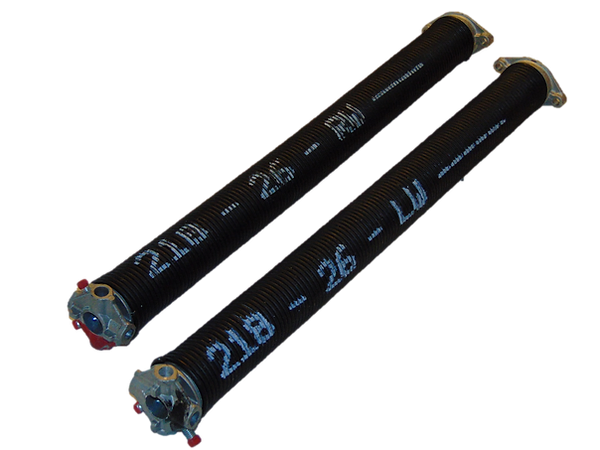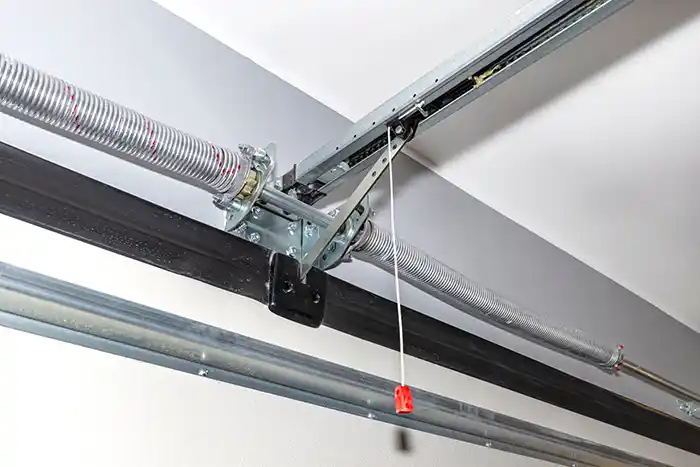Broken Garage Door Spring
If your garage door spring is broken, it’s important to take immediate action to avoid further damage or injury. Here are the steps you should take:
Do not attempt to operate the door manually
A broken spring can make it difficult or impossible to lift the garage door, and attempting to do so could cause further damage or injury. If you must, here is some helpful advice.
Call a professional garage door repair service
Garage door springs are under a significant amount of tension and can be dangerous to repair or replace without the proper tools and knowledge. A professional garage door repair service can safely and efficiently repair or replace the broken spring.
Keep the area clear
While waiting for the repair service to arrive, make sure to keep the area around the garage door clear of any objects or debris. This will ensure that the repair service can safely access the garage door and make the necessary repairs.
Remember, garage door springs are under a high amount of tension and can be dangerous to handle without the proper training and tools. It’s always best to call a professional to handle any garage door repairs.
If you need immediate repairs, call the local garage door experts at Sawtooth!

Torsion Springs
Torsion springs function by twisting or rotating around a central axis to apply force. To provide stored force when the garage door is closed, a garage door technician manually winds the spring upon installation.
Door Balance
When the door is shut, the weight of the door keeps the torsion spring from unwinding, despite its desire to do so and lift the door. This creates an equilibrium between the spring and the door.
Extra Lift
The stored force from the spring enables you to lift a door that weighs more than 100 pounds with minimal effort. As you lift the door, the spring unwinds, decreasing the upward force while transferring the door’s weight to the horizontal tracks. When the door is closed, the spring winds up, storing energy for the next time the door is opened. The process of balancing continues from start to finish, and a properly adjusted torsion spring is essential.

Extension Springs
In contrast to torsion springs, extension springs operate by stretching and contracting, similar to a slinky.
Storing Lift Energy
One end of the spring is connected to a rear hanger bracket, while the other end is fastened to the bottom of the door using a cable and pulley system. When the door is closed, the spring stretches, accumulating potential energy for future use when the door is opened again.
Additional Lift
Upon opening the door, the spring contracts, supplying additional lifting power to the door. This stretching and contracting of the spring, combined with the weight of the door, creates a counterbalance effect that ensures the door feels light and can be effortlessly operated in both upward and downward directions.

Spring Repair Safety
Garage door springs work hard and can store a lot of energy and force. As a result, this makes them dangerous in the hands of untrained professionals. Injuries resulting from improper handling of springs are all too common.
Always have a professional replace your springs!
It’s not worth the risk. Always call a professional garage door repair service like Sawtooth Garage Doors so you get springs replaced safely.
Heavy Duty Springs
Standard springs last 10,000 cycles on average so you can expect them to last 5-7 years depending on usage.
High cycle garage doors springs are made with thicker gauge steel and last longer. For a modest increase in part cost, you can get a 25,000 cycle torsion spring that can last twice as long as a standard spring. We think this is a wise investment and recommend it to all our clients.
If our crew is out to replace your springs, why not install a heavy duty spring that will last longer? It doesn’t cost that much more and you can double or even triple the life of the spring.
We’d be happy to discuss your options for upgrading your springs during our visit to you site.

Common Questions
Replacing a garage door spring typically costs between $100 and $300, depending on several factors. Here’s a detailed breakdown of what influences the cost:
- Type of Spring:
- Torsion Springs: These are more expensive and usually cost between $150 and $250 for replacement.
- Extension Springs: These are generally less expensive, ranging from $100 to $150.
- Labor Costs:
- Labor costs can vary but typically add $50 to $100 to the total cost.
- Quality of Parts:
- Higher-quality springs that last longer will cost more. Basic springs are cheaper, but premium ones with a longer lifespan can be up to 50% more expensive.
- Service Call Fee:
- Many companies charge a service call fee, which ranges from $50 to $100. This fee is often included in the total replacement cost quoted by the technician.
- Additional Repairs:
- If other parts of the garage door system are worn or damaged, additional repairs may increase the overall cost.
Average Cost Summary
- Single Spring Replacement: $100 to $200
- Dual Spring Replacement: $150 to $300
Example Pricing
- Extension Spring Replacement: $100 – $150 (parts and labor)
- Torsion Spring Replacement: $150 – $250 (parts and labor)
Garage door springs play a crucial role in facilitating the lifting and control of garage doors. Given that garage doors typically weigh over 150lbs, it can be challenging to manually lift them or operate them with an opener without some extra assistance. To address this, two types of springs are commonly used: torsion springs and extension springs.
Torsion springs are pre-wound or coiled by certified garage door technicians, storing a certain amount of force within them. These springs naturally tend to unwind, but the weight of the door prevents them from doing so. When an upward force is applied to a closed door, the energy stored in the spring, combined with the applied force, enables the door to open with minimal effort.
Similarly, extension springs fulfill the same purpose, but instead of winding and unwinding, they stretch and compress akin to a slinky toy. When the door is closed, the spring is stretched out and desires to compress, but the weight of the door maintains its balance. By applying a small force in addition to the stored energy in the stretched spring, the door can be opened.
In both cases, as the door is opened, the weight of the door is shifted to the horizontal tracks, resulting in reduced downward force. Conversely, as the door closes, more weight is transferred vertically, while the springs progressively provide increased upward force. This mechanism prevents the door from abruptly crashing down.
In summary, the primary function of garage door springs is to supply supplementary force, ensuring a delicate equilibrium between the door’s weight and the energy stored within the springs.
Yes it is. The amount of force stored or required in a spring is enough to help lift and lower a garage door weighing several hundred pounds. If the spring snaps or unwinds in an uncontrolled way, any parts improperly attached, like a tightening wrench, can fly off and cause tremendous harm or kill.
Saving a few hundred dollars is not worth the risk, leave garage door spring repair to the pros!
The lifespan of garage door springs can vary depending on several factors, including the type of springs, the quality of the springs, the frequency of usage, and the maintenance they receive. Here are some general guidelines for the expected lifespan of garage door springs:
- Torsion Springs: On average, torsion springs have a lifespan of about 7 to 12 years or 10,000 to 15,000 cycles. A cycle refers to one full opening and closing of the garage door. However, with regular maintenance and proper care, torsion springs can last longer.
- Extension Springs: Extension springs typically have a slightly shorter lifespan compared to torsion springs. They generally last between 5 to 7 years or around 10,000 cycles. Similarly, proper maintenance can help extend their lifespan.
It’s important to note that these are approximate estimations, and individual circumstances may vary. Factors such as the quality of the springs, the weight of the garage door, climate conditions, and usage patterns can influence the lifespan of garage door springs.
Regular maintenance and inspections can help identify issues early on and extend the lifespan of the springs. Lubricating the springs periodically, ensuring proper tension, and addressing any signs of wear or damage promptly can contribute to their longevity.
The value of heavy-duty springs for garage doors depends on several factors, including the specific circumstances and needs of the garage door user. Here are some considerations to help you determine if heavy-duty springs are worth the cost:
- Door Weight: Heavy-duty springs are typically recommended for garage doors that are exceptionally heavy or oversized. If your garage door falls into this category, investing in heavy-duty springs can provide the necessary lifting force to operate the door effectively and ensure smooth functionality.
- Durability and Longevity: Heavy-duty springs are designed to withstand the increased demands placed on them by heavier doors. They are built to be more robust and have a longer lifespan compared to standard springs. If you anticipate frequent usage or have concerns about the longevity of standard springs, heavy-duty springs might be a worthwhile investment.
- Safety and Reliability: Garage doors can be potentially hazardous if they malfunction or fail to operate properly. Heavy-duty springs are engineered to handle the additional weight of heavy doors more securely, reducing the risk of accidents or damage caused by spring failure. If safety and reliability are high priorities for you, investing in heavy-duty springs can provide peace of mind.
- Professional Recommendation: Consulting with a certified garage door technician is crucial in determining the appropriate type of springs for your specific garage door. They can assess the weight, size, and usage patterns of your door to provide expert advice on whether heavy-duty springs are necessary or beneficial in your case.
- Cost Considerations: Heavy-duty springs typically come at a higher cost compared to standard springs. It’s essential to weigh the upfront investment against the potential benefits they offer, such as improved performance, increased durability, and enhanced safety. Assess your budget and evaluate the long-term value and return on investment before making a decision.
Ultimately, the decision to invest in heavy-duty springs depends on the unique requirements of your garage door. Considering factors such as door weight, durability, safety, and professional recommendations will help you determine if the additional cost is justified in your specific situation.
Certain types of springs need periodic lubrication. To clarify, if your garage door uses extension springs, no lubrication is necessary. Extensions springs stretch or “extend” resulting in little friction.
On the other hand, torsion springs are wound up or down as the garage door opens or closes resulting in friction as the coils rub against each other. If you have powder coated torsion springs, no lubrication is necessary.
That leaves the more common galvanized torsion spring which does benefit from periodic lubrication. It’s important to use the preferred lithium grease spray or a silicone spray.
Never use WD-40 to lubricate your torsion spring (or other garage door components). WD-40 is a degreaser and will remove the all-important lubricating grease.
To lubricate the torsions springs, with the help of a stepladder, simply spray a reasonable amount of lithium grease across the top of the spring from end to end. After spraying, open and close the door a few times to work the grease in.
We recommend lubricating the torsion springs once or twice a year for optimal spring performance.
Identifying potential problems with garage door springs is important for maintaining the functionality and safety of your garage door system. Here are some signs that may indicate an issue with your garage door springs:
- Difficulty Opening or Closing: If you notice that your garage door is becoming increasingly difficult to open or close, it could be a sign of spring problems. Springs that are worn out, damaged, or losing tension may struggle to provide the necessary force to lift or lower the door smoothly.
- Uneven Movement: Pay attention to the movement of your garage door as it opens or closes. If it appears lopsided or uneven, with one side rising or lowering faster than the other, it could indicate a problem with the springs. Imbalanced or faulty springs can cause the door to operate unevenly and may require attention.
- Excessive Noise: While some noise is normal during the operation of a garage door, loud or unusual sounds, such as grinding, squeaking, or popping noises, may suggest a spring issue. Noises can occur when springs are worn out, misaligned, or in need of lubrication. If you notice new or concerning sounds, it’s worth investigating the springs.
- Visible Damage or Wear: Inspect your garage door springs visually for any visible signs of damage, such as cracks, gaps, or fraying. Additionally, check for signs of rust or corrosion, which can weaken the springs over time. Any visible wear or damage to the springs should be addressed promptly.
- Door Stays Open or Closes Too Quickly: If your garage door has trouble staying open or closes rapidly without control, it could indicate an issue with the springs. Faulty or imbalanced springs may fail to provide sufficient tension, leading to door instability or accelerated closing.
- Sagging or Stretching: Extension springs that appear stretched out or elongated beyond their normal state may require attention. Over time, these springs can lose tension or become worn, affecting the proper operation of the garage door.
If you notice any of these signs, it’s best to contact a professional garage door company like Sawtooth. We have the expertise to assess and diagnose spring problems accurately. Garage door spring repair or replacement should be handled by trained professionals due to the potential dangers associated with working with high-tension springs.













